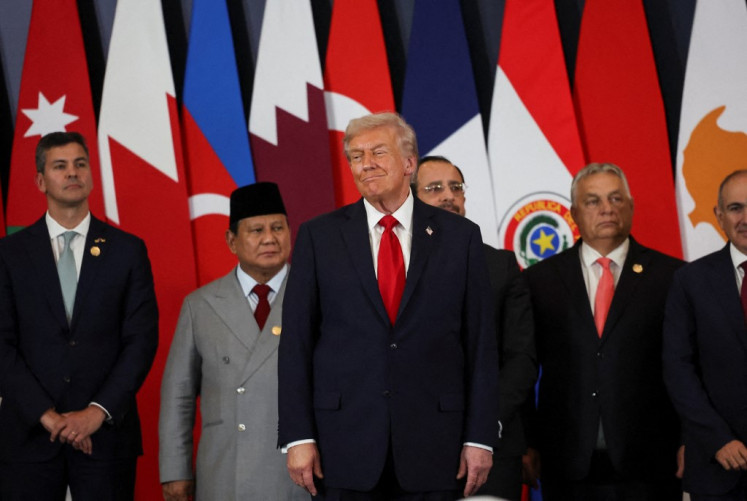Popular Reads
Top Results
Can't find what you're looking for?
View all search resultsPopular Reads
Top Results
Can't find what you're looking for?
View all search resultsIndustry calls for Manpower Law revision
The Indonesian Employers Association (Apindo) is calling for the government to reform the 2013 Manpower Law to keep up with new employment problems in the digitalization era, mainly concerning the waging system and protection for partnership-based employees and freelance workers
Change text size
Gift Premium Articles
to Anyone
T
he Indonesian Employers Association (Apindo) is calling for the government to reform the 2013 Manpower Law to keep up with new employment problems in the digitalization era, mainly concerning the waging system and protection for partnership-based employees and freelance workers.
Harijanto, Apindo chair for employment and social protection, said on Wednesday that Law No. 13/2013 on manpower had yet to regulate employer obligations, including on wages and protection, to their workers who worked under a partnership-based contract.
He said the prevailing law was limited to employer obligations and a monthly minimum wage for their full-time employees, hinting that it was somehow outdated compared to current changes in the market.
“What we need right now is a regulation that can help standardize the hourly, daily and weekly minimum wages and the protection for our freelance workers, as the relationship between employers and their employees has shifted in the era of Industry 4.0,” Harijanto said in a press briefing at Apindo headquarters in Jakarta, referring to the technological revolution in industries.
The reform, he said, was necessary given that more companies hired freelance workers and partners without set working hours as they often worked for multiple employers at once.
One example is a scheme used by online ride-hailing apps Go-Jek and Grab Indonesia, where motorcycle and car owners work as their partners rather than employees. This kind of relationship, he said, not only disrupted the traditional relationship between employers and employees, but also the waging system.
Such a new scheme had changed the waging system from a monthly wage to an output-based wage that might not comply with the prevailing law, which uses a minimum wage. “So, as the workers become more productive, the more money they will earn,” Harijanto said.
In order to catch up with the changes, Apindo suggested that the law be amended to include the minimum wage system for companies that employ their workers as partners and using an output-based system, as well as a protection scheme to facilitate companies to fulfil their obligations and protect freelance workers at the same time.
A number of advanced countries implement a time-based waging system in which governments regulate an hourly minimum wage companies must pay their workers.
Based on data compiled by The Jakarta Post, the minimum wage in Japan ranges from 761 yen (US$6.73) to 985 yen per hour, which is set on a prefectural and industry basis. State minimum wage rates in the United States, meanwhile, range from $5.15 per hour to $11.50 per hour as of July 1.
As of 2017 there were 31.9 million part-time workers in Indonesia, or 23.8 percent of the total workforce, data from Statistics Indonesia show. Meanwhile, 10.2 million people, or 7.64 percent of the country’s total workforce, were categorized as semi-unemployed.
Muhammad Faisal, executive director of the Center of Reform on Economics (CORE) Indonesia, applauded Apindo’s suggestion to reform the current labor law to be more inclusive, especially for freelance workers as their number continued to increase.
However, he said, the law should include different types of freelance workers. “In many countries, freelance workers are divided into two types: part-time workers and casual workers,” Faisal said.
Part-time workers, he said, were people working for one or more employers for less time than full-timers, who usually worked for eight hours a day. Casual workers, he went on, were those who worked for many employers at the same time or worked on a project-basis, which meant they were not bound by a long-term contract with one employer, he said.
Faisal said these types would help companies to categorize what waging system they should use to pay their workers, whether it was time-based or output based.
At the same time, Harijanto of Apindo said the law revision should include protection, as freelance workers, such as freelance journalists, graphic designers and content writers, were able to work for multiple employers at a time. Such a situation could create confusion among employers in carrying out their obligation to give protections such as insurance, retirement funds and social security, he said.
Faisal added that companies that hired casual freelance workers should not worry about workers’ protection, given that the Workers Social Security Agency (BPJS Ketenagakerjaan) and the Health Care and Social Security Agency (BPJS Kesehatan) enabled freelance workers to join the programs independently.
“In this case, the employers can just include the premiums in their wage,” he said.

















